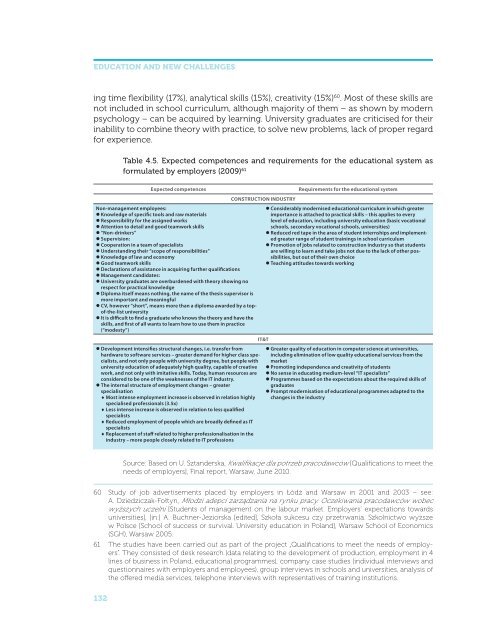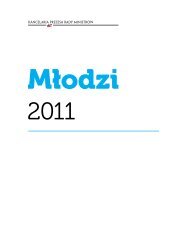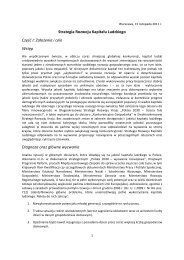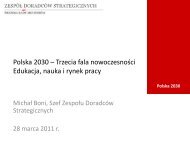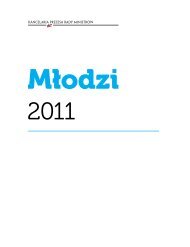Education and new challenges - Raport Polska 2030
Education and new challenges - Raport Polska 2030
Education and new challenges - Raport Polska 2030
You also want an ePaper? Increase the reach of your titles
YUMPU automatically turns print PDFs into web optimized ePapers that Google loves.
<strong>Education</strong> <strong>and</strong> <strong>new</strong> <strong>challenges</strong><br />
ing time flexibility (17%), analytical skills (15%), creativity (15%) 60 . Most of these skills are<br />
not included in school curriculum, although majority of them – as shown by modern<br />
psychology – can be acquired by learning. University graduates are criticised for their<br />
inability to combine theory with practice, to solve <strong>new</strong> problems, lack of proper regard<br />
for experience.<br />
Table 4.5. Expected competences <strong>and</strong> requirements for the educational system as<br />
formulated by employers (2009) 61<br />
Expected competences<br />
Non-management employees:<br />
•zKnowledge of specific tools <strong>and</strong> raw materials<br />
•zResponsibility for the assigned works<br />
•zAttention to detail <strong>and</strong> good teamwork skills<br />
•z“Non-drinkers”<br />
•zSupervision:<br />
•zCooperation in a team of specialists<br />
•zUnderst<strong>and</strong>ing their “scope of responsibilities”<br />
•zKnowledge of law <strong>and</strong> economy<br />
•zGood teamwork skills<br />
•zDeclarations of assistance in acquiring further qualifications<br />
•zManagement c<strong>and</strong>idates:<br />
•zUniversity graduates are overburdened with theory showing no<br />
respect for practical knowledge<br />
•zDiploma itself means nothing, the name of the thesis supervisor is<br />
more important <strong>and</strong> meaningful<br />
•zCV, however “short”, means more than a diploma awarded by a topof-the-list<br />
university<br />
•zIt is difficult to find a graduate who knows the theory <strong>and</strong> have the<br />
skills, <strong>and</strong> first of all wants to learn how to use them in practice<br />
(“modesty”)<br />
•zDevelopment intensifies structural changes, i.e. transfer from<br />
hardware to software services – greater dem<strong>and</strong> for higher class specialists,<br />
<strong>and</strong> not only people with university degree, but people with<br />
university education of adequately high quality, capable of creative<br />
work, <strong>and</strong> not only with imitative skills. Today, human resources are<br />
considered to be one of the weaknesses of the IT industry.<br />
•zThe internal structure of employment changes – greater<br />
specialisation<br />
♦♦Most intense employment increase is observed in relation highly<br />
specialised professionals (3.5x)<br />
♦♦Less intense increase is observed in relation to less qualified<br />
specialists<br />
♦♦Reduced employment of people which are broadly defined as IT<br />
specialists<br />
♦♦Replacement of staff related to higher professionalisation in the<br />
industry – more people closely related to IT professions<br />
CONSTRUCTION INDUSTRY<br />
IT&T<br />
Requirements for the educational system<br />
•zConsiderably modernised educational curriculum in which greater<br />
importance is attached to practical skills – this applies to every<br />
level of education, including university education (basic vocational<br />
schools, secondary vocational schools, universities)<br />
•zReduced red tape in the area of student internships <strong>and</strong> implemented<br />
greater range of student trainings in school curriculum<br />
•zPromotion of jobs related to construction industry so that students<br />
are willing to learn <strong>and</strong> take jobs not due to the lack of other possibilities,<br />
but out of their own choice<br />
•zTeaching attitudes towards working<br />
•zGreater quality of education in computer science at universities,<br />
including elimination of low quality educational services from the<br />
market<br />
•zPromoting independence <strong>and</strong> creativity of students<br />
•zNo sense in educating medium-level “IT specialists”<br />
•zProgrammes based on the expectations about the required skills of<br />
graduates<br />
•zPrompt modernisation of educational programmes adapted to the<br />
changes in the industry<br />
Source: Based on U. Szt<strong>and</strong>erska, Kwalifikacje dla potrzeb pracodawców [Qualifications to meet the<br />
needs of employers], Final report, Warsaw, June 2010.<br />
60 Study of job advertisements placed by employers in Łódź <strong>and</strong> Warsaw in 2001 <strong>and</strong> 2003 – see:<br />
A. Dziedziczak-Fołtyn, Młodzi adepci zarządzania na rynku pracy. Oczekiwania pracodawców wobec<br />
wyższych uczelni [Students of management on the labour market. Employers’ expectations towards<br />
universities], [in:] A. Buchner-Jeziorska [edited], Szkoła sukcesu czy przetrwania. Szkolnictwo wyższe<br />
w Polsce [School of success or survival. University education in Pol<strong>and</strong>], Warsaw School of Economics<br />
(SGH), Warsaw 2005.<br />
61 The studies have been carried out as part of the project „Qualifications to meet the needs of employers”.<br />
They consisted of desk research (data relating to the development of production, employment in 4<br />
lines of business in Pol<strong>and</strong>, educational programmes), company case studies (individual interviews <strong>and</strong><br />
questionnaires with employers <strong>and</strong> employees), group interviews in schools <strong>and</strong> universities, analysis of<br />
the offered media services, telephone interviews with representatives of training institutions.<br />
132


